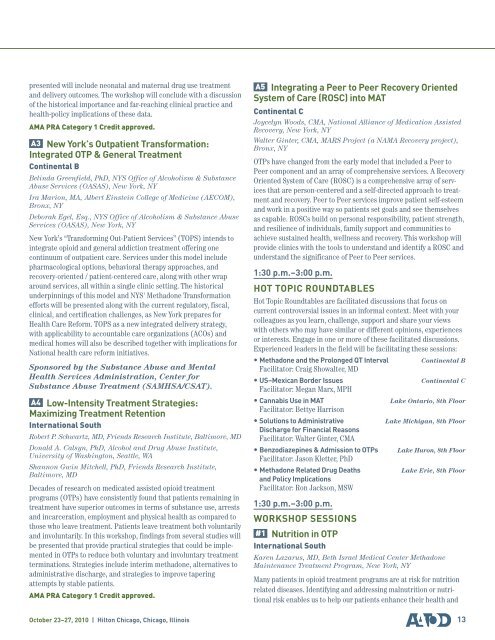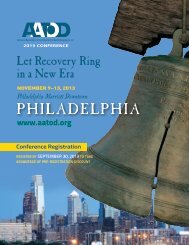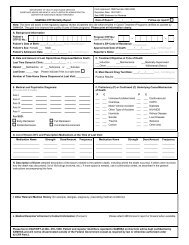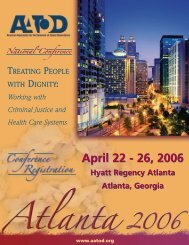Final Conference Program - aatod
Final Conference Program - aatod
Final Conference Program - aatod
You also want an ePaper? Increase the reach of your titles
YUMPU automatically turns print PDFs into web optimized ePapers that Google loves.
presented will include neonatal and maternal drug use treatment<br />
and delivery outcomes. The workshop will conclude with a discussion<br />
of the historical importance and far-reaching clinical practice and<br />
health-policy implications of these data.<br />
AMA PRA Category 1 Credit approved.<br />
A3 New York’s Outpatient Transformation:<br />
Integrated OTP & General Treatment<br />
Continental B<br />
Belinda Greenfield, PhD, NYS Office of Alcoholism & Substance<br />
Abuse Services (OASAS), New York, NY<br />
Ira Marion, MA, Albert Einstein College of Medicine (AECOM),<br />
Bronx, NY<br />
Deborah Egel, Esq., NYS Office of Alcoholism & Substance Abuse<br />
Services (OASAS), New York, NY<br />
New York’s “Transforming Out-Patient Services” (TOPS) intends to<br />
integrate opioid and general addiction treatment offering one<br />
continuum of outpatient care. Services under this model include<br />
pharmacological options, behavioral therapy approaches, and<br />
recovery-oriented / patient-centered care, along with other wrap<br />
around services, all within a single clinic setting. The historical<br />
underpinnings of this model and NYS' Methadone Transformation<br />
efforts will be presented along with the current regulatory, fiscal,<br />
clinical, and certification challenges, as New York prepares for<br />
Health Care Reform. TOPS as a new integrated delivery strategy,<br />
with applicability to accountable care organizations (ACOs) and<br />
medical homes will also be described together with implications for<br />
National health care reform initiatives.<br />
Sponsored by the Substance Abuse and Mental<br />
Health Services Administration, Center for<br />
Substance Abuse Treatment (SAMHSA/CSAT).<br />
A4 Low-Intensity Treatment Strategies:<br />
Maximizing Treatment Retention<br />
International South<br />
Robert P. Schwartz, MD, Friends Research Institute, Baltimore, MD<br />
Donald A. Calsyn, PhD, Alcohol and Drug Abuse Institute,<br />
University of Washington, Seattle, WA<br />
Shannon Gwin Mitchell, PhD, Friends Research Institute,<br />
Baltimore, MD<br />
Decades of research on medicated assisted opioid treatment<br />
programs (OTPs) have consistently found that patients remaining in<br />
treatment have superior outcomes in terms of substance use, arrests<br />
and incarceration, employment and physical health as compared to<br />
those who leave treatment. Patients leave treatment both voluntarily<br />
and involuntarily. In this workshop, findings from several studies will<br />
be presented that provide practical strategies that could be implemented<br />
in OTPs to reduce both voluntary and involuntary treatment<br />
terminations. Strategies include interim methadone, alternatives to<br />
administrative discharge, and strategies to improve tapering<br />
attempts by stable patients.<br />
AMA PRA Category 1 Credit approved.<br />
A5 Integrating a Peer to Peer Recovery Oriented<br />
System of Care (ROSC) into MAT<br />
Continental C<br />
Joycelyn Woods, CMA, National Alliance of Medication Assisted<br />
Recovery, New York, NY<br />
Walter Ginter, CMA, MARS Project (a NAMA Recovery project),<br />
Bronx, NY<br />
OTPs have changed from the early model that included a Peer to<br />
Peer component and an array of comprehensive services. A Recovery<br />
Oriented System of Care (ROSC) is a comprehensive array of services<br />
that are person-centered and a self-directed approach to treatment<br />
and recovery. Peer to Peer services improve patient self-esteem<br />
and work in a positive way so patients set goals and see themselves<br />
as capable. ROSCs build on personal responsibility, patient strength,<br />
and resilience of individuals, family support and communities to<br />
achieve sustained health, wellness and recovery. This workshop will<br />
provide clinics with the tools to understand and identify a ROSC and<br />
understand the significance of Peer to Peer services.<br />
1:30 p.m.–3:00 p.m.<br />
HOT TOPIC ROUNDTABLES<br />
Hot Topic Roundtables are facilitated discussions that focus on<br />
current controversial issues in an informal context. Meet with your<br />
colleagues as you learn, challenge, support and share your views<br />
with others who may have similar or different opinions, experiences<br />
or interests. Engage in one or more of these facilitated discussions.<br />
Experienced leaders in the field will be facilitating these sessions:<br />
• Methadone and the Prolonged QT Interval<br />
Continental B<br />
Facilitator: Craig Showalter, MD<br />
• US–Mexican Border Issues<br />
Continental C<br />
Facilitator: Megan Marx, MPH<br />
• Cannabis Use in MAT<br />
Lake Ontario, 8th Floor<br />
Facilitator: Bettye Harrison<br />
• Solutions to Administrative<br />
Lake Michigan, 8th Floor<br />
Discharge for Financial Reasons<br />
Facilitator: Walter Ginter, CMA<br />
• Benzodiazepines & Admission to OTPs Lake Huron, 8th Floor<br />
Facilitator: Jason Kletter, PhD<br />
• Methadone Related Drug Deaths<br />
Lake Erie, 8th Floor<br />
and Policy Implications<br />
Facilitator: Ron Jackson, MSW<br />
1:30 p.m.–3:00 p.m.<br />
WORKSHOP SESSIONS<br />
#1 Nutrition in OTP<br />
International South<br />
Karen Lazarus, MD, Beth Israel Medical Center Methadone<br />
Maintenance Treatment <strong>Program</strong>, New York, NY<br />
Many patients in opioid treatment programs are at risk for nutrition<br />
related diseases. Identifying and addressing malnutrition or nutritional<br />
risk enables us to help our patients enhance their health and<br />
October 23–27, 2010 | Hilton Chicago, Chicago, Illinois 13








